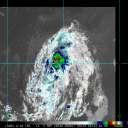Show Selection:
|
#899886 (Received by flhurricane at: 10:50 PM 26.Aug.2017)
TCDAT4
Tropical Storm Harvey Discussion Number 27
NWS National Hurricane Center Miami FL AL092017
1000 PM CDT Sat Aug 26 2017
The central convection associated with Harvey has shown warming
cloud tops during the past several hours, although radar data shows
widespread rain continuing near and north of the center. Winds
from the New Braunfels WSR-88D are near 65 kt at 1500-2500 ft near
the center, but it is uncertain how well these winds are mixing down
to the surface. The initial intensity is reduced to a somewhat
uncertain 45 kt based mainly on the radar data.
Harvey has drifted east-northeastward since the last advisory.
While the model guidance is not in great agreement, it appears that
the cyclone will drift southward or southeastward during the next
couple of days due to the distant influence of a trough digging into
the eastern United States. After that time, a building ridge over
the Gulf of Mexico should cause Harvey to drift generally
northward. The new forecast track is similar to the previous track
and lies near the consensus models. At this time, the forecast
track keeps the center of Harvey inland, as there is not enough
agreement between the models that the center of Harvey will actually
emerge over water.
Harvey should continue to weaken to a tropical depression during the
next day or so as the cyclone remains inland. As the center nears
the coast, it is likely that the cyclone will maintain that status
for several days as a large amount of the circulation will be over
the water. By the end of the forecast period, the system should be
far enough inland so that Harvey will again weaken. An alternative
scenario is that Harvey could re-intensify if the center emerges
over the Gulf.
Key Messages:
1. While Harvey's winds are decreasing, life-threatening hazards
will continue from heavy rainfall over much of southeastern
Texas and from storm surge along portions of the Texas coast.
2. Catastrophic and life-threatening flooding is expected across the
middle and upper Texas coast from additional rainfall of 15 to
25 inches, with isolated storm totals as high as 40 inches, through
Thursday. Please heed the advice of local officials and do not
drive into flooded roadways. Refer to products from your local
National Weather Service office and the NOAA Weather Prediction
Center for more information on the flooding hazard. A summary of
rainfall totals compiled by the Weather Prediction Center can be
found at: www.wpc.ncep.noaa.gov/discussions/nfdscc1.html
3. A Storm Surge Warning remains in effect for portions of the
Texas coast. Life-threatening storm surge flooding will be slow to
recede due to the slow motion of Harvey and a prolonged period of
onshore flow. For a depiction of areas at risk, see the Storm Surge
Watch/Warning Graphic at hurricanes.gov.
FORECAST POSITIONS AND MAX WINDS
INIT 27/0300Z 29.3N 97.3W 45 KT 50 MPH...INLAND
12H 27/1200Z 29.1N 97.4W 35 KT 40 MPH...INLAND
24H 28/0000Z 28.9N 97.3W 30 KT 35 MPH...INLAND
36H 28/1200Z 28.5N 97.0W 30 KT 35 MPH...INLAND
48H 29/0000Z 28.4N 96.8W 30 KT 35 MPH...INLAND
72H 30/0000Z 29.0N 96.5W 30 KT 35 MPH...INLAND
96H 31/0000Z 30.0N 96.5W 30 KT 35 MPH...INLAND
120H 01/0000Z 31.0N 96.5W 25 KT 30 MPH...INLAND
$$
Forecaster Beven |



